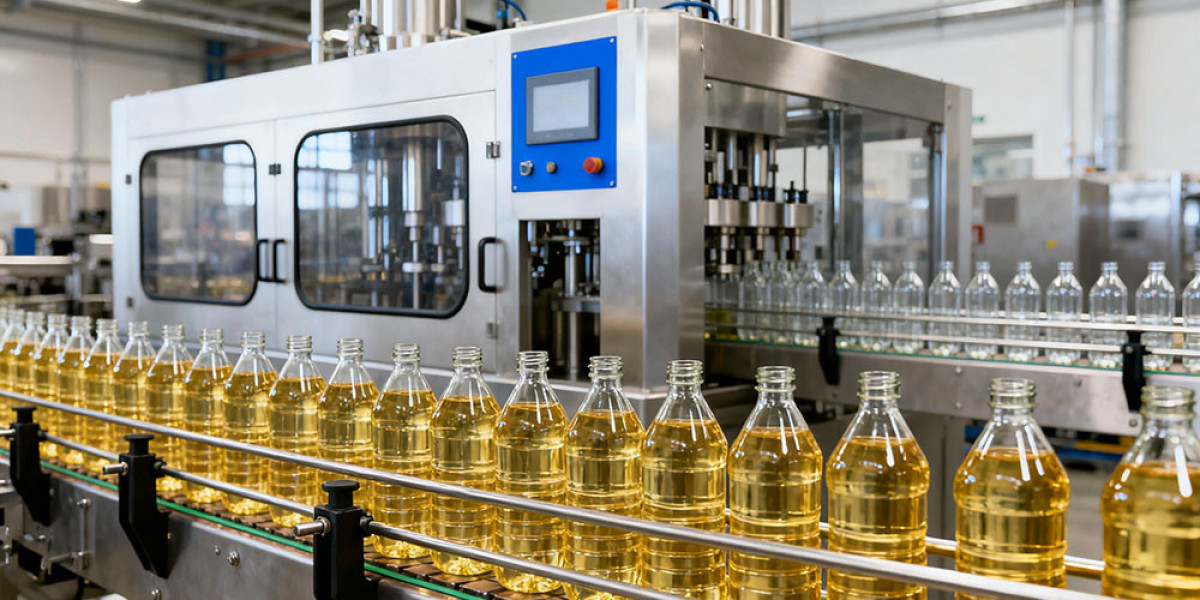In the edible oil industry, equipment downtime and material waste directly reduce enterprise profits. Outdated filling equipment often leads to slow filling speeds, inconsistent filling volumes, and frequent maintenance needs. The solution lies in industrial-grade edible oil filling machine. Such equipment can optimize production line processes, cut costs, and meet market demands. This article will guide you on how to select the right filling machine model for your plant.
Edible Oil Filling Machine Models for Various Production Scales
Different edible oil plants have diverse needs. Whether you are mass-producing cooking oil or filling high-end olive oil, there is a corresponding filling machine available. Here are several common types:
High-Speed Filling Machines for Large-Scale Plants
High-speed filling machines are specifically designed for large-scale plants and can complete the filling of thousands of edible oil bottles per day. Some models can handle 3,000 to 6,000 bottles per hour for 500ml containers, making them ideal for mass-market edible oil production. For 1L oil bottles, certain models can reach a capacity of 4,000 bottles per hour. Equipped with advanced conveyor systems and multi-nozzle filling technology, these machines also support 24/7 non-stop operation.
Glass Bottle-Specific Filling Machines for High-End Oils
High-end oils such as olive oil and sesame oil are often packaged in glass bottles. However, glass is fragile, and ordinary filling machines tend to cause bottle breakage. Glass bottle-specific filling machines solve this problem through a "gentle conveying" design: they not only maintain a filling speed of 3,000 to 6,000 bottles per hour but also come with soft-grip conveyor tracks and adjustable nozzles, ensuring both intact packaging and uncompromised production efficiency.
Tracking-Type Filling Machines for Viscous Oils
Viscous oils like olive oil and peanut oil require the use of tracking-type filling machines. These machines can complete filling simultaneously as bottles move along the production line. Through continuous operation, they reduce oil spillage and ensure uniform filling. Most models can handle 3,000 to 3,600 bottles per hour for standard-sized containers, making them particularly suitable for the production of specialty oils. The smooth tracking conveying also minimizes bottle jams.
Medium-Sized Filling Machines for Growing Plants
Medium-sized filling machines strike a balance between production capacity and cost, and are designed specifically for plants in the expansion stage. For 500ml to 1L containers, these models can fill approximately 1,800 bottles per hour, boasting both durability and space-saving advantages. Additionally, most medium-sized filling machines adopt a modular design, allowing for the later addition of functions such as capping as needed. This enables enterprises to invest reasonably while avoiding overcommitment.
Why Industrial-Grade Edible Oil Filling Machines Boost Productivity
These machines accurately address the core pain points of plant managers, with distinct advantages:
Ensuring Food Safety
All components in contact with edible oil are made of SUS304 or SUS316L stainless steel. This material is corrosion-resistant, easy to clean, and complies with global food safety standards such as those set by the FDA (U.S. Food and Drug Administration). It helps enterprises avoid the risk of product recalls and pass various quality inspections with ease.
Reducing Labor Costs
Equipped with automated functions such as bottle detection and automatic filling, one machine can replace the workload of multiple workers. This frees employees from repetitive tasks and allows them to focus on quality control instead.
Minimizing Material Waste
Precision servo motors accurately control the filling volume of each bottle, avoiding oil waste caused by "over-filling" and customer dissatisfaction due to "under-filling". This not only reduces raw material costs but also enhances customer trust.
Reducing Downtime
Industrial-grade components can withstand high-intensity use and only require basic daily maintenance (such as cleaning and lubrication). With low equipment failure rates, they ensure the continuous operation of the production line and guarantee the on-time delivery of orders.
Real-World Case: A Plant’s Productivity Transformation
Take a medium-sized edible oil plant as an example. Previously, it used a manual-assisted filling system, which could only handle 800 bottles per hour with an oil waste rate of 5%. After upgrading to a tracking-type filling machine, the plant’s hourly filling capacity increased to 3,200 bottles, the waste rate dropped to less than 1%, labor costs decreased by 30%, and it could fulfill twice the number of orders without adding production shifts. Such productivity improvement is a common result of equipment upgrades.
How to Select the Right Filling Machine for Your Plant
Start with three core questions: What is your production volume target? What type of packaging (material, size) do you use? What types of edible oil do you need to fill?
- For mass-produced edible oil in plastic bottles, choose a model that can fill more than 3,000 bottles per hour;
- For high-end oils in glass bottles, select a specialized machine with "gentle conveying" functionality.
In addition, pay attention to the ease of equipment maintenance—prioritize models with easy-to-detach components and clear operation manuals to reduce subsequent maintenance costs.
An industrial-grade edible oil filling machine is not just an equipment purchase, but an investment in the future of your plant. It can eliminate production bottlenecks, reduce waste, and support the scale expansion of your enterprise. By selecting the right model, you can turn production challenges into competitive advantages.



